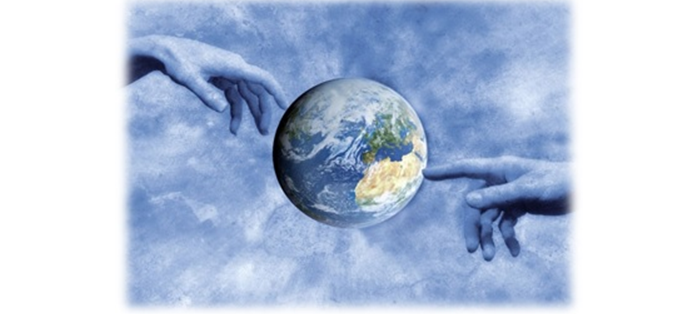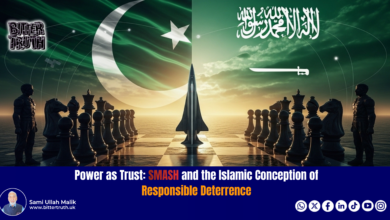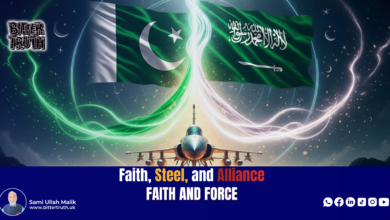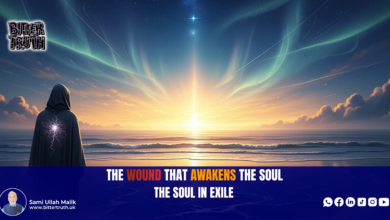The Philosophy of the Quran and the Promotion of Science
Islam’s impact is extensive and multifaceted. It has not only unveiled the mysteries of monotheism, elevated human dignity, and purified the realms of ethics and character, but it has also illuminated hearts with the love of the Divine, and created a society so pure and lofty that the history of the world finds it unparalleled. However, Islam’s greatest contribution to the world religions is its encouragement of intellectual pursuit, dissemination of reason and wisdom, and the emergence of new sunrises of inference and deduction on the world’s dark horizons.
It is not difficult to understand how the desert-dwelling Arabs, within a short span of time, ascended to the pinnacle of civilization, breathed new life into the dormant realms of wisdom and knowledge, and revitalized the neglected streams of sciences and arts. Is it not astonishing that a nation unfamiliar with literacy and writing, almost overnight, dominated the throne of philosophy and wisdom? Not only did they quench the thirst for knowledge with the wines of Greek thought, but they also infused these draughts with the intoxications and ecstasies unique to the Islamic revelation.
In our view, this remarkable transformation resulted from the teachings of the Holy Quran, which awakened the spirit of inquiry and research. This great change owes itself to the divine revelation, which began with the word “Iqra” (Read). The Holy Quran fostered a genuine intellectual taste among Muslims and shaped their thinking in the beautiful molds of science and philosophy. To accurately answer this question, we must consider these four points:
- The Holy Quran explicitly recognized the objectivity of this universe, regarded life with respect, and emphasized that a Muslim’s goal is to benefit from the beauty and enhancement of both this world and the hereafter.
- This book of guidance clearly stated that the universe around us is governed by an order and purpose.
- The Holy Quran dispelled the misconception that there is a contradiction between religion and the demands of reason.
- It is also a miracle of this book that it guided towards the paths of reasoning and deduction, which we term as inductive reasoning in logic.
What is the nature of this universe? Do these beautiful skies, these green trees, these rivers winding like serpents, these solid rocks, and standing mountains possess real existence, or are they mere illusions of perception and thought? Philosophers and religious scholars are sharply divided on this issue, resulting in two completely opposite theories about the nurturing and evolution of civilization, sciences, and arts. If the universe exists and this world has an external reality, it means we have adopted the correct approach to thought and observation and have found justification for the creativity of sciences and arts and the embellishments of civilization. If the realities of this world are mere illusions or have no existence at all, it means we have underestimated the significance of life, misunderstood its purpose, and encouraged a monastic and unsocial life, bringing nothing but pessimism and despair to humanity.
These two paths of negation and affirmation are not only separate but lead to different destinations. Affirmation means the vibrancy and evolution of life, the promotion of sciences and arts, progress, and overcoming the challenges of the universe to bring it under our control. Negation, on the other hand, means deprivation, despair, pessimism, ignorance, and adopting stagnation and backwardness.
Hence, if Islam has acknowledged this world of water and clay, it means it has expressed full confidence in human knowledge and insight, adopting an approach to thought and observation that is free from skepticism. In other words, by accepting the objective reality of the universe, Islam has identified the basis upon which the edifices of human thought and experience are constructed.
Most Greek philosophers acknowledged this colorful world. Their contention was merely about the elements involved in its composition and whether this world is static or dynamic. Plato was the first to deviate from this consensus, diverting the stream of debate after two hundred and fifty years to the point of questioning whether this material world is even real. According to Plato, this world is merely a reflection or duplicate of the real world, which is complete and unchanging and is only manifested through perception or forms. Plato’s objection was based on the irregularities of this world. Observing its imperfections and disasters, he denied it as the real world and proclaimed that these imperfections could not be attributed to the Demiurge, who tried to manifest these perfect concepts into matter. The flaw lies in matter’s inability to fully embrace these perfect forms. Although Plato laid the foundation for idealism, which later resulted in the complete negation of the material world, he at least acknowledged the existence of an eternal designer and matter.
When Christianity felt the need to present religious doctrines in the light of reason, Plato’s ideas and Plotinus’ interpretations seemed most suitable, as they naturally prioritized the concept of the soul over the body. According to these philosophies, the body is seen as an impediment or evil that hinders the flight and progress of the heart and soul. This implies that as long as a person does not free themselves from bodily demands and desires, they are not worthy of salvation. Clearly, this way of thinking is based on a retreat from the tangible and essential realities of life, a logical consequence of the philosophy adopted by Christianity following Plato and his interpreter Plotinus.
If the phenomena of the universe possess objectivity, then the body is also objective, and its demands inherently possess objectivity. On this basis, if we consider it, the nurturing and development of these demands and desires is a matter of realism rather than sensuality. The decisive point here is that no action or effort, not even asceticism or austerity, is spiritual in the sense that it entirely excludes the body’s participation and the influence of desires and aspirations. In our view, an element of spirituality emerges in any action or deed, which is inevitably physical, when it is performed based on psychological motives connected to a great ideal or a noble value. This means that when an action or deed rises above personal benefit to align with a universal or humanitarian perspective, it is then imbued with spirituality. Otherwise, no action or deed is inherently spiritual or non-spiritual in itself. This duality in action and deed is based on the false assumption that humans are composed of two contradictory entities: body and soul. In reality, body and soul are not two separate and opposing things but two aspects or reflections of the same human truth. More precisely, one should say that humans have two levels of thinking and acting: one we call spiritual and the other physical.
Another clear example of denying the reality of the universe can be found in the Hindu principle of “Maya,” which simply means that this world, with all its beauty, is an illusion and not worthy of human attention. According to this philosophy, humans should not engage with the interests of this world or consider the innovations of civilization worthy of attention. The negative philosophy of “Maya” has deprived Hindus of the vitality, courage, and creativity necessary for engaging in life. This is not only a historical issue but also a contemporary problem because underlying it is the question of whether such an unscientific and unsympathetic view of the world can awaken the spirit of inquiry and research in humans, and whether it can foster the deep engagement and effort necessary for knowledge and understanding. In “Eastern Religions and Western Thought,” Radhakrishnan has acknowledged the sharpness of this objection and tried to respond. We cannot say whether Dr. Schweitzer finds the nature of this response satisfying.
From the philosophical and mystical interpretation of “Maya,” it is clear that Hindu thinkers, influenced by Western civilization, have finally recognized the gap between the demands of life and the negation of life. Interestingly, Islam was the first to identify this gap, but at that time, neither the Christian nations paid attention to it, nor did Hindu philosophy feel the need for this new interpretation of “Maya.” However, now that the evolution of time has pushed both into the tumult of life, both have realized that monasticism and the philosophy of “Maya” are no longer viable in the present era.
Understanding how accepting the objective reality of the universe leads to the development of a scientific mindset and temperament, and how adopting this perspective brings far-reaching and pleasant changes in various aspects of civilization, we now turn to see how the Holy Quran has expressed this reality in various styles:
أَوَلَمْ یَرَالَّذِیْنَ کَفَرُوا أَنَّ السَّمَاوَاتِ وَ الْأَرْضَ کَانَتَا رَتْقاً فَفَتَقْنَاھمَا وَ جَعَلْنَا مِنَ الْمَاء کُلَّ شَیْ حَیٍّ أَفَلَا یُؤْمِنُونَ (انبیاء:30)
Have those who disbelieved not considered that the heavens and the earth were a joined entity, and We separated them and made from water every living thing? Then will they not believe?
(2)خَلَقَ اللَّھ السَّمَاوَاتِ وَ الْأَرْضَ بِالْحَقِّ انَّ فِیْ ذَلِکَ لَآیَةً لِّلْمُؤْمِنِیْنَ(عنکبوت:44)
Allah created the heavens and the earth in truth. Indeed, in that is a sign for the believers.
(3)أَ فَلَایَنظُرُونَ اِلَی الْابِلِ کَیْفَ خُلِقَتْ، وَالَی السَّمَاءکَیْفَ رُفِعَتْ،وَالَی الْجِبَالِ کَیْفَ نُصِبَتْ،وَالَی الْأَرْضِ کَیْفَ سُطِحَتْ (غاشیہ:71-20)
Then do they not look at the camels – how they are created? And at the sky – how it is raised? And at the mountains – how they are erected? And at the earth – how it is spread out?
وَ لَقَدْ زَیَّنَّا السَّمَآءَ الدُّنْیَا بِمَصَابِیْحَ وَ جَعَلْنٰهَا رُجُوْمًا لِّلشَّیٰطِیْنِ وَ اَعْتَدْنَا لَهُمْ عَذَابَ السَّعِیْرِ(ملک:5)
And We have certainly beautified the nearest heaven with stars and have made [from] them what is thrown at the devils and have prepared for them the punishment of the Blaze.
(5)فَاطِرُ السَّمَاوَاتِ وَ الْأَرْضِ (الشوریٰ :11)
In Surah An-Nahl, he expressed the fact that not adorning the ego with the clothes of objectivity and bestowing it with the khilaat of creativity and innovation is the attribute due to which we have distinction from all our creatures.
(6)أَفَمَن یَخْلُقُ کَمَن لاَّ یَخْلُقُ أَفَلَا تَذَكَّرُونَ(النحل:17)
Then is He who creates like one who does not create? So, will you not be reminded?
The Quran’s description and wording about the creation of the universe negate all the concepts spawned by idealism. Another equally significant point is that if this universe is not a product of chance but is created by a wise and knowledgeable God, then it must have order and system, rules and regulations, and be fashioned in such a way that humans can fully benefit from it.
The Quran repeatedly emphasizes that there is no flaw or imperfection in this workshop of beauty. There are no shortcomings in its order and arrangement. Everything here has a measure, and every entity reflects a certain elegance and style.
The Quran does not consider this universe to be contrary to human interests and benefits. It does not see it as hostile or discordant but rather deems it suitable for human habitation. Humans can partake in its joys, refine their tastes and morals through its beauty and enhancement, and go a step further to understand the laws embedded within it, using them for the betterment and welfare of society.
There is no doubt that science, in itself, has no concern with purpose or aim. Its subject matter is to understand the potential evolution of matter and, in the light of this knowledge, take further steps in experimentation and understanding. Rather than getting entangled in the bounds of debate, it tries to comprehend that, from a purely scientific perspective, this universe does not guide towards any purpose or aim. Or, one could say that science remains completely neutral on this matter. It does not reveal whether the universe has a purpose or if it lacks one entirely. However, from a philosophical viewpoint, it becomes apparent that without accepting purpose and meaning, no reasonable explanation for the phenomena of existence is possible.
The crucial question here is why this material universe embodies such useful laws and benefits. Why does water quench thirst? Why does food provide satiety and energy, and why is the stomach structured in such a way that it can easily assimilate food? Similarly, why do herbs and plants possess healing properties? More specifically, the question seeks to know why this universe and all its contents, as a whole, have characteristics that fulfill various needs. Is it merely the result of human exploration and discovery that we found different beneficial aspects in these entities, or were these aspects of utility pre-embedded in these entities by God’s wisdom, which we discovered through our quest and research?
It is evident that the manner of creation clearly indicates that this universe did not come into existence randomly and without wisdom, allowing humans to enjoy its compatibilities and utilize everything here for their needs. Instead, it is a well-thought-out and deliberate system established with these very purposes in mind.
By representing the teleological mode of thought, we aim to demonstrate that the perspective the Quran provides about this universe fulfills the requirements of knowledge and science more effectively. When the Quran repeatedly states that everything in this universe is for you, including the vast seas, the expansive earth, the radiant sun and moon, and the changes and rotations of day and night, all dedicated for your benefit, this expression naturally instills a strong desire in humans to know all about these things.
We are aware that there are some objections to the teleological mode of argumentation. The most difficult and pointed question among them is that if this universe is the beautiful creation of a perfect being, why do we see the blemishes of suffering, injustice, disease, and distress? Or, in the words of a philosopher, if half of this universe is adorned with the flowers of thought, taste, beauty, and intellect, why is the other half filled with the stench of enmity, malice, disease, and greed?
Hume, in his dialogues, has constructed a high tower of skepticism on such objections, questioning the necessity of the patches of evil in goodness and the exhibition of flaws alongside beauty and elegance.
When faced with the issue, Plato deflected by asserting that this world, the subject of our objections, isn’t the true reality. According to him, it is merely a crude representation of the true world of ideas or forms, which is indeed beautiful, complete, and unchanging. However, from our standpoint, grounded in the teachings of the Quran, we staunchly affirm the objective reality of this world. To address this conundrum, we propose three reasonable solutions:
- Educational Perspective: We could adopt Keats’ viewpoint, which suggests that this world is essentially a training ground. Here, we learn the art of transforming discord and flaws into harmony and goodness. In other words, the presence of conflict and imperfection is not due to nature’s negligence but rather to enhance our intellect and teach us how to overcome these challenges.
- Relative Perspective: Alternatively, we might echo the Mutazilite’s stance, which posits that this world, in its present form, is the best possible one. According to this view, the perception of evil and flaws is merely relative stemming from our partial understanding of particulars, not from the overarching wisdom that is wholly good and perfect.
- Evolutionary Perspective: Lastly, we could embrace the notion that these objections pertain to a world still under construction. If the process of evolution is ongoing and this potential world is yet to achieve its full refinement, reaching further stages of completion and perfection, then we might consider the presence of imperfection and evil as temporary and transitional. Ultimately, these defects are to be eradicated through human effort and perseverance.
In support of these demands, consider these evidences of the Holy Qur’an:
1- وَالشَّمْسُ تَجْرِي لِمُسْتَقَرٍّ لَّهَاذَلِکَ تَقْدِیْرُالْعَزِیْزِالْعَلِیْمِ(یٰس:38)
And the sun runs [on course] toward its stopping point. That is the determination of the Exalted in Might, the Knowing.
2-اِنَّاجَعَلْنَامَاعَلَی الْأَرْضِ زِیْنَةً لَّھَالِنَبْلُوَھُمْ أَیُّھُمْ أَحْسَنُ عَمَلاً(الکہف:7)
Indeed, We have made that which is on the earth adornment for it that We may test them [as to] which of them is best indeed.
3-هُوَٱلَّذِي جَعَلَ لَكُمُ ٱلۡأَرۡضَ ذَلُولٗافَٱمۡشُواْفِي مَنَاكِبِهَا وَكُلُواْمِن رِّزۡقِهِۦۖوَإِلَيۡهِ ٱلنُّشُورُ(ملک:15)
It is He who made the earth tame for you – so walk among its slopes and eat of His provision – and to Him is the resurrection.
4-الشَّمْسُ وَالْقَمَرُبِحُسْبَانٍ(الرحمٰن:5)
The sun and the moon [move] by precise calculation
5-قَدْ جَعَلَ اللَّهُ لِكُلِّ شَيْءٍ قَدْرًاالطلاق:3)
Allah has already set for everything a [decreed] extent.
6-وَسَخَّرَلَکُمُ اللَّیْلَ وَالْنَّھارَوَالشَّمْسَ وَ الْقَمَرَوَالْنُّجُومُ مُسَخَّرَاتبِأَمْرِهِ إِنَّ فِي ذَٰلِكَ لَآيَاتٍ لِّقَوْمٍ يَعْقِلُونَ (النحل:12)
And He has subjected for you the night and day and the sun and moon, and the stars are subjected by His command. Indeed, in that are signs for a people who reason.
7- أَلَمْ تَرَأَنَّ اللَّهَ سَخَّرَ لَكُم مَّا فِي الْأَرْضِ وَالْفُلْكَ تَجْرِي فِي الْبَحْرِ بِأَمْرِهِ وَيُمْسِكُ السَّمَاءَ أَن تَقَعَ عَلَى الْأَرْضِ إِلَّا بِإِذْنِهِ إِنَّ اللَّهَ بِالنَّاسِ لَرَءُوفٌ رَّحِيمٌ (الحج:65)
Do you not see that Allah has subjected to you whatever is on the earth and the ships which run through the sea by His command? And He restrains the sky from falling upon the earth, unless by His permission. Indeed Allah, to the people, is Kind and Merciful.
8-وَمَاخَلَقْنَاالسَّمَاء وَالْأَرْضَ وَمَابَیْنَھُمَالَاعِبِیْنَ(دخان:38)
And We did not create the heavens and earth and that between them in play.
The third point which can lead to the advancement of the evolutionary links of science and philosophy and thanks to which the Muslims pushed the Aqeela sciences to the horizon in only three or four centuries, was that there was such a turn in the flight of thought and knowledge and the revelations of nature. It does not come where the principles of religion are undermined. The point of view nurtured by the Holy Qur’an was that there is no contradiction between reason and religion, rather it is more appropriate to say that both are two sides of the same reality. The Lord who has taught values for the ablution of the human soul, laid out the map of life and given beautiful templates of jurisprudence and law for the intellectual guidance of man, why would he want that the intellect and wisdom he has given Capabilities fall against these values, distort this map of life and be considered as the cause of denying this aspect of Lordship, which is intended to give man his rightful place in this universe and all these intellectuals. And be fully endowed with intellectual and practical qualities that can help him to hold the high position of Khilafat Al-Ilah, the only possible duality in religion and intellect is that we are convinced of the dualism in the universe and that Accept the fact that the fulfillment and development of the requirements of religion and religion is the responsibility of Allah, and the creation of intellectual and intellectual advancements is the responsibility of someone.
It has been taken by a force which is related to evil rather than good, to contradiction and negation, and this force has created the innovations of intellect and wisdom for the purpose that both may always remain and never reconciliation and unity. But if man is one, his nature is one and the coin of obedience and government of the same Allah is flowing in this whole universe, then it becomes impossible that there is a conflict and contradiction in the mind and intellect or at any level. There should also be duality because when the source of both is the same, the origin and the root are the same, then it is a necessary and logical result that not only there is no contradiction and discord between them, but on the contrary, they find perfect harmony and unity. Go and this is the way of thinking and the way of looking which the holy Quran has adopted about the intellect and mind.
Experiences of religion and reason or religion and science are two different aspects of life, which we cannot avoid in any way because if we do not trust the source of knowledge that has come to us through millions of prophets, it means nothing. These are that we are deprived of this great cultural and spiritual heritage, from which character and morals are refined, the wealth of faith and belief, the endless construction is obtained and above all, because of which we are And two, a definite and meaningful objective is available for the struggle. In the same way, if we do not keep the demands of reason and wisdom awake, do not work with research and observation, are not deaf to new experiences and revelations and do not assess how much our experiences and considerations are related to nature. If you can reveal the secrets of Sarbasta, then when is it easy to bear the damage that will be caused by it? With this, our personality will remain incomplete, i.e., we will be unable to express our intellectual implications that create new revolutions in space and time, and the spheres of civilization will shrink and dry up, thought will become dull and dead. will, and the whole system of life will not be able to have the fresh and favorable climate in which the bud of a living and vibrant culture can thrive and flourish. In other words, if we want to live a full life and make use of everything from the facts of thought and sight to the charms of the heart and soul, then it is necessary that we accept such a school of thought that is compatible with religion and the world, intellect and religion. May the blessings of both be equal, and thanks be to Allah that our Madrasa Fiqr Islam embraces them both.
The Holy Qur’an specifies that a person cannot have two hearts on his side, which clearly means that we cannot maintain dualism in our beliefs and concepts, that is, it cannot be that we can use the teachings of the Qur’an and Sunnah to understand the universe, Form an opinion about nature or the conditions around us and based on the results derived from sciences and arts, the concepts and beliefs that we rightly understand are of a different nature. If religion and religion is the message of Allah and the result of the blessings of this eternal knowledge, in which there is no possibility of any slip or omission about the past, present and future, then it is necessary that the teachings derived from it are in any way spiritual. It should not be contrary to the times, that is, any revelation of knowledge and experience in any era should not create surprise in the circles of the people of right, but it should be that whenever a new reality comes to the fore with the development of science and technology. It should be known that there is no strangeness in it, but it is a familiar fact in principle. Yes, it is certainly true that sometimes a conflict and contradiction is felt between them and it becomes so intense that it seems as if these two are rivals, in which a decisive battle has broken out, and apparently the only possibility left now is that May one of the two survive and the other may forever accept his defeat. Those who have made even a cursory study of the revival of the sciences in the West will testify that there have been many turning points between the Church and science, in which the two rivals are pitted against each other. .
But this form of conflict has proved to be temporary and subsequent investigations have revealed that the contradiction between the two is actually a result of misunderstanding and usually occurs when either the religion or religion is not interpreted based on correct principles. Or non-scientific and non-scientific conclusions should be drawn from science and sciences. If the scientific and academic principles are taken into account in the interpretation and interpretation of religion, in the light of which a higher reality is determined in the true sense, and only those conclusions are drawn from science which are final and irrevocable, then it is impossible that both There is even a slight difference.
Moreover, this conflict and contradiction is largely due to our haste and impatience. Our habit is that every new discovery of science makes a noise that it is not good for religion and religion, although that revelation is not final and decisive in any way, but it is only a prelude to the next revelation, and the next revelation is even the final letter. Even then, this does not change anything about the principles of religion, rather it is the opposite, only that the style of interpretation and interpretation of religion and religion changes in some minor and interpretive issues and is more subtle and higher than before. Not only that, it also becomes more convincing. This is the reason why the holy Quran has emphasized on the study of the universe and has repeatedly directed the mind to consider the wider world spread around and in front of it. Look at the sky and the earth. Disagreement should be considered as the goal of the day and night. Ride the winds. Examine the limits of the blessings of Sahab and Abar. Discuss the construction of mountains. Look at the camel and see the wonders of nature that have been deposited in its creation. This call for thought and consideration is the fourth point or aspect due to which the demand for intellectual sciences was awakened among Muslims. The result of which was that these desert nomads touched the highest towers of civilization only thanks to Islam and developed so much in medicine, chemistry, geography, astronomy, logic, philosophy and speech that for years Europe continued to enjoy their research.
In this call for study and observation, two things are particularly worth considering. One is that the thought and reflection that the Holy Qur’an called for is not the Aristotelian abstract thought, which is completely sterile and fruitless in terms of results, and from which some It is not attainable, but the mood of contemplation is inductive, which means that generalities are derived from the study and experience of details. It is obvious that this path is the path of sound science and there is a danger of new revelations in it, but despite this, the Holy Qur’an insists that you should consider this approach and think in the same way and let the delusions of thought and vision be common. do it. Allah Ta’ala who is the Knower of the Unseen knows very well what the dangers of this path and what kind of revolution are will come in the world of knowledge from this study and research. Meanwhile, when the Lord of the Universe has ordered that the Muslim minds should not be confused. Keep the candles of knowledge and research burning and the flag of research and investigation is waved in the world, then this clearly means that there is no danger of conflict and contradiction in the system of life which the Holy Qur’an advocates and in the rapid speeds of intellect.
This is the intellectual part of the Quran in the promotion of philosophy and science. Consider the following verses for details and reference:
فَأَقِمْ وَجْهَكَ لِلدِّينِ حَنِيفًافِطْرَتَ اللَّهِ الَّتِي فَطَرَالنَّاسَ عَلَيْهَالَا تَبْدِيلَ لِخَلْقِ اللَّهِ ذَٰلِكَ الدِّينُ الْقَيِّمُ وَلَـٰكِنَّ أَكْثَرَ النَّاسِ لَا يَعْلَمُونَ (روم:30)
So, direct your face toward the religion, inclining to truth. [Adhere to] the fitrah of Allah upon which He has created [all] people. No change should there be in the creation of Allah. That is the correct religion, but most of the people do not know.
یُؤتِیْ الْحِکْمَةَ مَن یَشَاء ُوَمَن یُؤْتَ الْحِکْمَةَ فَقَدْأُوتِیَ خَیْراًکَثِیْراً(البقرة:269)
He gives wisdom to whom He wills, and whoever has been given wisdom has certainly been given much good. And none will remember except those of understanding
قَدْجَاءکُم بَصَآئِرُمِن رَّبِّکُمْ فَمَنْ أَبْصَرَ فَلِنَفْسِهِ وَمَنْ عَمِيَ فَعَلَيْهَا وَمَا أَنَا عَلَيْكُم بِحَفِيظٍ (الانعام:104)
There has come to you enlightenment from your Lord. So whoever will see does so for [the benefit of] his soul, and whoever is blind [does harm] against it. And [say], “I am not a guardian over you.”
) وَمِنھُم مَّن یَقُولُ رَبَّنَاآتِنَافِیْ الدُّنْیَاحَسَنَةً وَفِیْ الآخِرَةِ حَسَنَةً وَقِنَاعَذَابَ النَّارِ(البقرة:201
But among them is he who says, “Our Lord, give us in this world [that which is] good and in the Hereafter [that which is] good and protect us from the punishment of the Fire.”
مَّاجَعَلَ اللَّهُ لِرَجُلٍ مِّن قَلْبَيْنِ فِي جَوْفِهِ(الاحزاب:4)
Allah has not made for a man two hearts in his interior.
أَفَلَمْ يَنظُرُواإِلَى السَّمَاءِ فَوْقَهُمْ كَيْفَ بَنَيْنَاهَا وَزَيَّنَّاهَاوَمَالَهَا مِن فُرُوجٍ،وَالْأَرْضَ مَدَدْنَاهَا وَأَلْقَيْنَا فِيهَا رَوَاسِيَ وَأَنبَتْنَا فِيهَا مِن كُلِّ زَوْجٍ بَهِيجٍ،تَبْصِرَةً وَذِكْرَىٰ لِكُلِّ عَبْدٍ مُّنِيبٍ(ق:6-8)
Have they not looked at the heaven above them – how We structured it and adorned it and [how] it has no rifts? And the earth – We spread it out and cast therein firmly set mountains and made grow therein [something] of every beautiful kind, Giving insight and a reminder for every servant who turns [to Allah].
إِنَّ فِي خَلْقِ السَّمَاوَاتِ وَالْأَرْضِ وَاخْتِلَافِ اللَّيْلِ وَالنَّهَارِوَالْفُلْكِ الَّتِي تَجْرِي فِي الْبَحْرِ بِمَا يَنفَعُ النَّاسَ وَمَا أَنزَلَ اللَّهُ مِنَ السَّمَاءِ مِن مَّاءٍ فَأَحْيَا بِهِ الْأَرْضَ بَعْدَ مَوْتِهَا وَبَثَّ فِيهَا مِن كُلِّ دَابَّةٍ وَتَصْرِيفِ الرِّيَاحِ وَالسَّحَابِ الْمُسَخَّرِ بَيْنَ السَّمَاءِ وَالْأَرْضِ لَآيَاتٍ لِّقَوْمٍ يَعْقِلُونَ (البقرة:164)
Indeed, in the creation of the heavens and earth, and the alternation of the night and the day, and the [great] ships which sail through the sea with that which benefits people, and what Allah has sent down from the heavens of rain, giving life thereby to the earth after its lifelessness and dispersing therein every [kind of] moving creature, and [His] directing of the winds and the clouds controlled between the heaven and the earth are signs for a people who use reason.
Undoubtedly, in the creation of the heavens and the earth, and in the coming of the next day after it, and in the ships that sail on the sea, in the things that benefit people, and in the causes of poverty, and in the rainwater that Allah sent down from the sky, thereby giving life to the earth while it was dry. And every kind of animal spread in it, and in the changing of the winds, and in the clouds that move between the sky and the earth. There are proofs for those who act with reason.
The purpose is that the development of science and art among Muslims and the birth of such great thinkers as Kundi, Razi, Ibn Majah, Ibn Sina, Farabi, Ibn Rushd and Ghazali is not because the civilization and culture of Greece and Iran have influenced them. had created a sudden change in the heart and mind, but the main and main reason for this was the internal revolution that was created by the teachings of the Holy Qur’an and the yearning and dedication that automatically led to efforts and research as a result of Islamic teachings. Otherwise, it was the same Arabs who considered camphor to be salt and considered silver more valuable than gold. Those who were victims of various illusions, but the pages of history bear witness to not only benefiting from his investigations on every aspect of life, but also following him to teach manners and manners in life.






